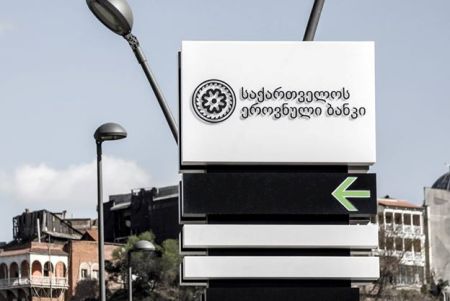National Bank of Georgia will fully repay IMF debt in 2014

Georgia will fully pay off its debt to the International Monetary Fund (IMF) at the end of the year, said head of the National Bank of Georgia (NBG) in Parliament today while delivering the bank’s 2013 annual report.
Before summarizing previous year’s trends, achievements and figures, head of the bank Giorgi Kadagidze announced the bank would completely pay off its IMF debt, which will be the first case since 1994 when Georgia will not be in debt to the international financial institution.
"In terms of external debt servicing, Georgia has entered its final phase,” he said.
"We paid the International Monetary Fund $380 million in 2013. This year we will pay the last tranche of the loan. I can say that the National Bank of Georgia will not have debts to the IMF from 2014.”
"This is a very important factor especially for those groups and companies who are watching our macroeconomic situation analysis,” Kadagidze said.
Meanwhile, Kadagidze said the bank’s major priorities last year were to develop its capital market and keep its international reserves "at an adequate level”.
"Georgia operates a floating exchange rate regime which is the most optimal tool for small and open economies like Georgia’s and it performs a shock absorbent function where in the case of external shocks the change of the exchange rate weakens influence of that shock on the economy,” Kadagidze explained.
According to the NBG report, in order to prevent speculative expectations on the market, NBG started to supply the market with currency. In November-December 2013 this figure was $220 million USD. Meanwhile, NBG purchased $335 million USD in total at the capital market. Accordingly, despite the fact the central bank covered part of the IMF debt ($382 million USD), the international monetary reserves only decreased by $50 million USD and at the end of 2013, it accounted for 2.8 billion USD.
In Parliament Kadagidze also discussed Georgia’s interest rates trends which were mentioned in the report.
"There is a stereotype that Georgia has got one of the highest interest rates in the region [and] world, which is not true. We ordered the international auditory organisation KMPG to conduct research which has shown that Georgia has got much lower interest rates than its neighbours. Of course, [Georgia’s interest rates] are not as low as in western European countries but it is also clear that our economy is not in the same condition as Western economies. If we look at the dynamic, there is a trend of significant decrease,” Kadagidze said.
A point Kadagidze specifically mentioned regarded the assessments by IMF and World Bank’s joint Financial Sector Assessment Program (FSAP), which assessed NBG’s performance as "successful”.
The mission said Georgia’s banking system was sustainable however it stressed the risks connected with dollarization, liquidity and concentration of the loans.
"However those risks are significantly mitigated at the moment,” Kadagidze stated.
At the end of the report, Kadagidze provided Members of Parliament (MPs) with information about the reforms recently implemented by the bank, including the so-called ‘export of reforms’, which envisaged sharing NBG’s experience to central banks of other countries. To date more than 10 countries from the ex-Soviet Union, Africa, Eastern Asia and Eastern Europe indicated they wanted consultations with NBG in the scope of this program.
After listening to the report, MPs unanimously supported NBG’s 2013 annual report with 72 favourable votes.
 Tweet
Tweet  Share
Share